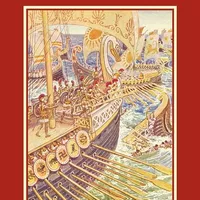07. The Children of Israel
"Unto a land flowing with milk and honey." —EXODUS iii. 8.
The children of' Jacob, or Israel, lived long in the land of Egypt, on the plot of land given to them by Pharaoh. Fifty-four years after his father, Joseph died. Like Jacob, he yearned to be buried in the land of his fathers, but for the present this was impossible. The years rolled on, and king after king reigned and died in Egypt, until the memory of Joseph was forgotten.
Meanwhile the children of Israel were rejoicing in the good pasture-land watered by the Nile, the land of Goshen as it was called, between Memphis and the Great Sea, and their families increased, till they had become quite a large colony in the land of Egypt. But in course of time there arose a Pharaoh, who no longer cared to have all Joseph's descendants settled in the land; this great colony of foreigners would be a danger in case of war. So he set taskmasters over them and oppressed them. He took them away from their quiet shepherd lives, to "service in the field," such as we still see along the banks of the Nile. There to-day the peasants work under the burning sun, drawing up buckets of water, from the level of the river, to pour on the fields above. The children of Israel were made to build the high brick walls, too, which surrounded the old cities of the land of Goshen; they were treated as slaves, and beaten by the Egyptians in authority over them, until we seem to hear their bitter cries, for deliverance from this bondage.
At last, as more and more children were born to the children of Israel, Pharaoh ordered that all the sons born to these strangers should henceforth be thrown into the Nile.
But a son was born, soon after this order, to a great grandson of Jacob's, and he was so beautiful, that his mother hid him in the house, for three months. Then, fearing for his life, she put him in a little boat or basket made of reeds, and laid him away among the rushes, by the river-side.
The story of Moses is well known, and every child has heard how the royal princess, one of Pharaoh's daughters, came down with her maidens, to bathe in the river. How she found the little basket and the crying child within, and how she had not the heart to let the baby drown. How he was nursed by his own mother, brought up in the house of the Egyptian princess, and named Moses: "Because," said the princess, "I drew him out of the water." Now, though Moses was brought up as an Egyptian child, he was yet an Israelite at heart; when he grew old enough he resented seeing his own people badly treated, and even beaten, in the land of their adoption. And this was the man chosen to lead his own people from the land of Egypt, back to their own land—the land given to their forefathers Abraham and Jacob—the land of Canaan.
The story of their start for home is very picturesque. One can see the shepherd tribes of Goshen snatching their last hasty meal; their feet, usually bare, now shod for their long journey; men, women, and children with staffs in their hands, their long Eastern garments girt up round their waists, for walking over the sandy desert.
It was night too; probably one of those glorious African nights, with stars shining out brightly, even as they shine to-day over stretches of veldt, while the moon lit up the country round.
"Get you forth from among my people; also take your flocks and herds, as ye have said, and be gone," were the words wrung at last from the reluctant Pharaoh, who had so long refused to let them go. So in that quiet starlit night, the children of Israel, like a huge army, with their camels and asses, stole forth from Egypt, on their way back to their fatherland.
Very soon the green pasture-land of the Nile was left behind; the scorching desert track lay before.
Encamped by the shores of the Red Sea, suddenly a cry of alarm would run through the vast multitude, as across the ridges of the desert hills came the terrible Egyptian chariots pursuing after them. In the midst of their terror the sun sank down, and darkness fell over the waters of the Red Sea, which cut them off from the land of Canaan. The story of their crossing over is too well known to repeat. When morning broke over the hills of Arabia, they stood in safety on the farther shore, but the chariots and horsemen of Egypt had perished in the waters.

